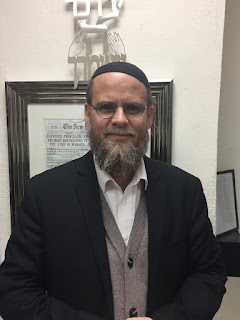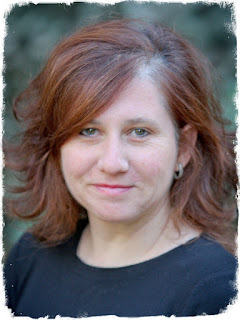Rabbi David Milston - "Total Commitment"
Rabbi David Milston has been the Director of the Overseas
Program at Midreshet HaRova for the last twenty years. Born and raised in
London, Rabbi Milston earned a B.A. in Jewish Studies at Jews' College where he
became a talmid "muvhak" of Rabbi Isaac Bernstein zt'l. He studied
for several years at Yeshivat Har Etzion under the guidance of Rav Yehuda
Amital, zt”l and Rav Aharon Lichtenstein, zt”l, and received semicha from the Chief Rabbinate of Israel.
In addition to his role at Midreshet HaRova, Rabbi Milston
lectures and delivers shiurim to youngsters and adults, including in his home
community of Alon Shevut where he lives with his wife and five of their six
children, the eldest Michal is married. He also performs weddings for couples,
both religious and secular, all across Israel, through the Tzohar organization.
Rabbi Milston has written a five book series on the parsha –
"The Three Pillars, and a two volume series on the Jewish Calendar –
"Ki Va Moed". A two volume work on Neviim Rishonim –
"Eternity", And a Hagada, that is a combination of his work and the
art of an alumnus.
1. What was a place, person or event that transformed your
ideas, thinking, or perspective?
In truth, thankfully, my ideas are transforming all the
time; One event, however, does come to mind. It was about 16 years ago. I had
been to Poland twice already beforehand, but this was the first time I was
travelling with my students and not my peers; it was also the first time I
would be seeing the Chassidic face of Poland, not only the Holocaust side. It
turned out to be a revelation; visiting and learning about Rebbe Elimelech of
lizansk, Chassidut Pashischa, Kotzk and Gur, opened up an entirely new
“adventure” in my Torah studies and experience. Until then most of my Judaism
had been focused on Lithuanian learning. For the last 15 years I have been
benefitting from the “best of both worlds”!
More recently we have extended our school trips to the
Ukraine.
2: What Jewish message does the world need to hear?
Towards the beginning of the story of the Tam and Chacham,
Rebbe Nachman says a sentence that to my mind is “life changing”:
“This makes no difference to me – this is what I do, that is
what he does, why should we be constantly looking over our shoulders at other
people?”
We are all unique, we must look at others in order to help
them, but in our own lives we must be focused on ourselves, our mission. We
must do what we believe to be right, but simultaneously always show tolerance
to those who think otherwise. I remember a scene in Chariots of fire, when the
coach points out to Harold Abrams, that he lost the race because he turned his
head to look to see where his opponent was – we are in danger of losing our
lives because we spend too much time looking at others.
3: How do you handle failure?
Failure is humbling, as it is to make a mistake – I have
great experience in both; it is important because it reminds us of our
limitations. Of course, when we do fail, we are in danger of despairing and
simply giving up; so many of us do not get close to our potential because we
are so scared of failure. The ethos that I believe in is to slightly adapt that
famous saying of Tennyson to say: “Better to have tried and failed than to
never have tried at all”. We gain experience from our failures, so as long as we
know how to analyze and learn from our mistakes, we can keep moving forward.
4: If you were to give advice to your younger self, what
would it be?
Don’t be so arrogant as to imagine that you know so much
more than those older and more experienced in life than yourself. Listen to
your elders and learn from them.
5: What is one way that you spoil yourself a little?
Taking some time off work.
6: How do you get back on track if you have had an
unproductive or distracted period?
There is a beautiful piece by Netivot Shalom on Parashat Behalotecha.
The Rebbe is explaining how the Mishkan is to travel through the Midbar; or in
his words how as dedicated Jews we are to travel through life. He suggests that
just as when the cloud covers the Mishkan, we stop travelling in the Midbar; so
too in life when one lacks clarity, don’t try to move forwards, hold your
ground, retain your status quo, persevere – the cloud will inevitably ascend,
clarity will then return, and you can continue to move forward in life.
7: What’s the best piece of advice you ever
received?
The best advice I ever received was to make Aliyah. I have
been in Israel for over thirty years; I am proud and fulfilled by the fact that
I am living in my Homeland with my family, baruch Hashem. I was encouraged by
the shlichim at Bnei Akiva, and this dream come true of living a prophecy has
become and remains my life’s mission. I am so privileged to be a part of Shivat
Tzion (Return to Israel). As I am sure you are aware, we have many elections in Israel, but
politics aside, every time I go to vote I feel absolutely privileged to be
living in a generation that has the ability to live independently in her
Homeland. Though I no longer do Miluim, I enjoyed the same fulfilling feeling
every time I returned to the army for reserve duty, joining my brothers as a
modern day Maccabee.
In all honesty, and with enormous siayata dishmaya (Divine assistance), the
ability, so far, to keep our school/dormitory functioning, whilst strictly
adhering to Governmental corona guidelines has been one of the hardest projects
I have ever faced. Bezrat Hashem, we should be able to continue to succeed to
educate bnot Yisrael towards Eretz, Am and Torat Yisrael.
9: What area do you see that Rabanim do
not stress enough?
I think that in our Religious teachings we need to emphasize
the connection between three fundamental facets of life in the following order:
Between a man and himself; between a man and his fellow; between a man and God.
Until we truly confront ourselves, we will never manage to be at peace
socially; and if we cannot honor and respect and tolerate our fellows, a true
relationship with the Almighty is out of the question.
10: What part of Jewish learning is your main focus or
favourite? How would you recommend people to get more deeply into it?
Chassidut. For those of us without Chassidic backgrounds, I
think Netivot Shalom opens up Chassidut. There is an interesting paradox, in
that Chassidism came about, at least to a degree, in order to bring religion
and Judaism to the less educated masses; yet many of the original Chassidic
works are unfathomable to the uneducated in the subject. Many of the writings
of the Slonimer Rebbe touch on fundamental Chassidut that you can then find in
more challenging writings such as Sfat Emet. It reminds of when we were younger
and couldn’t grasp a comment in Tosfot, we often referred to Tosfot HaRosh, that
we found to be easier to comprehend, I remember it being very helpful. For me
Chasidut is the neshama of my Jewish learning.
11: I have often thought that we in the modern orthodox
community are walking a tightrope between different worlds both of which we
want to belong to and be active in which may detract from our full attention to
one or the other particularly to the Jewish side. Can you give some ideas or
direction how to connect more deeply to the Torah and Hashem? (Books, ideas,
programmes, activities)
If we are to succeed in walking this “tightrope of Modern
Orthodoxy”, I think that we need to establish our “Total commitment to
halacha”. It is us who must adapt to halacha, and not visa versa. We need to be
very self-aware as to where we are weak, and be careful not to indulge in those
areas that we are likely to fail in. Self-control and discipline are essential.
Yet the real issues that challenge us in this area, to my mind, is the
education of our children. We may well feel confident in our ability to
confront and succeed in certain areas of modernity, that of course does not
mean that our children have the same ability. So, I suggest first and foremost
caution.
Coming up - interviews with Rav Alex Israel and Rav Yakov Nagen. Subscribe so you don't miss them.




Comments
Post a Comment